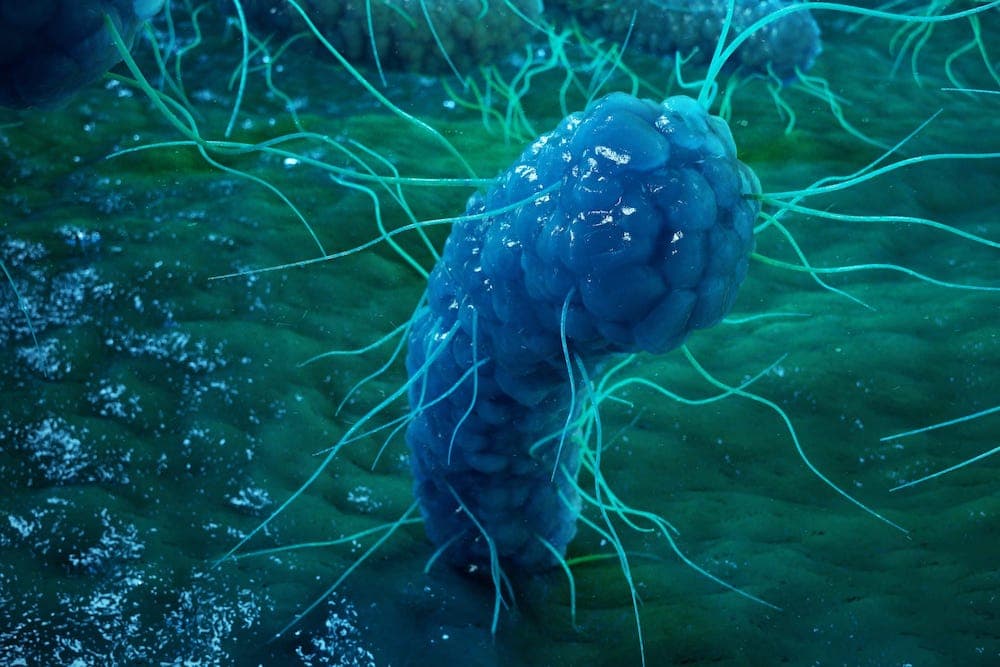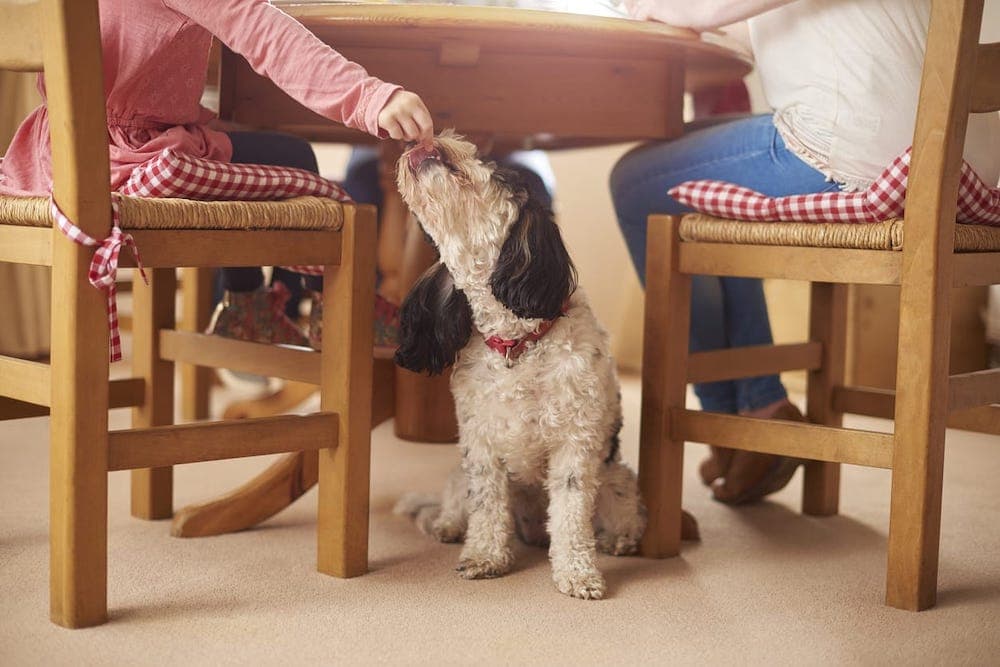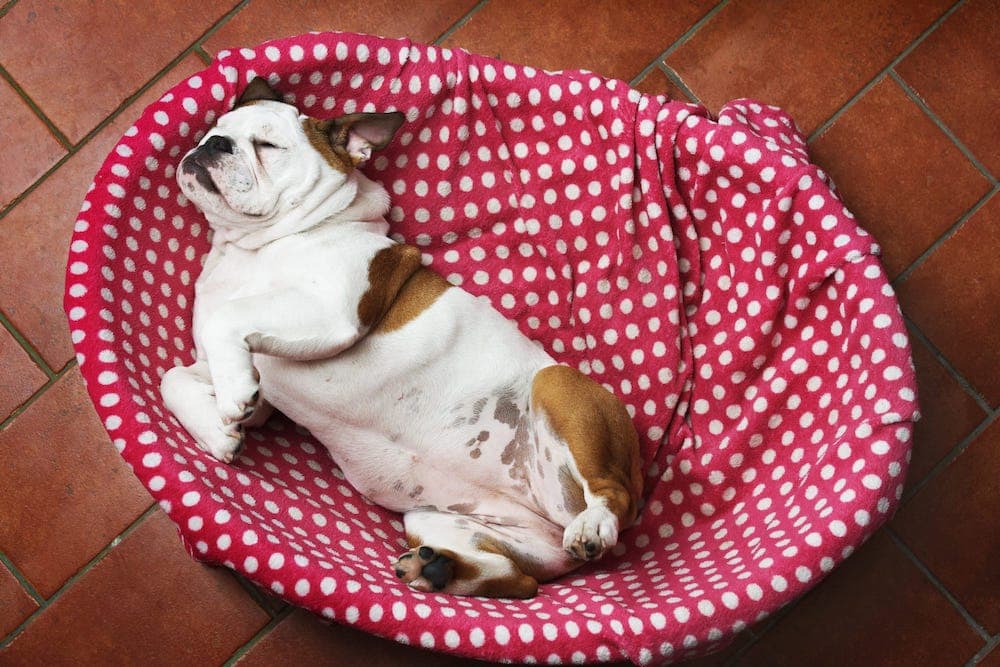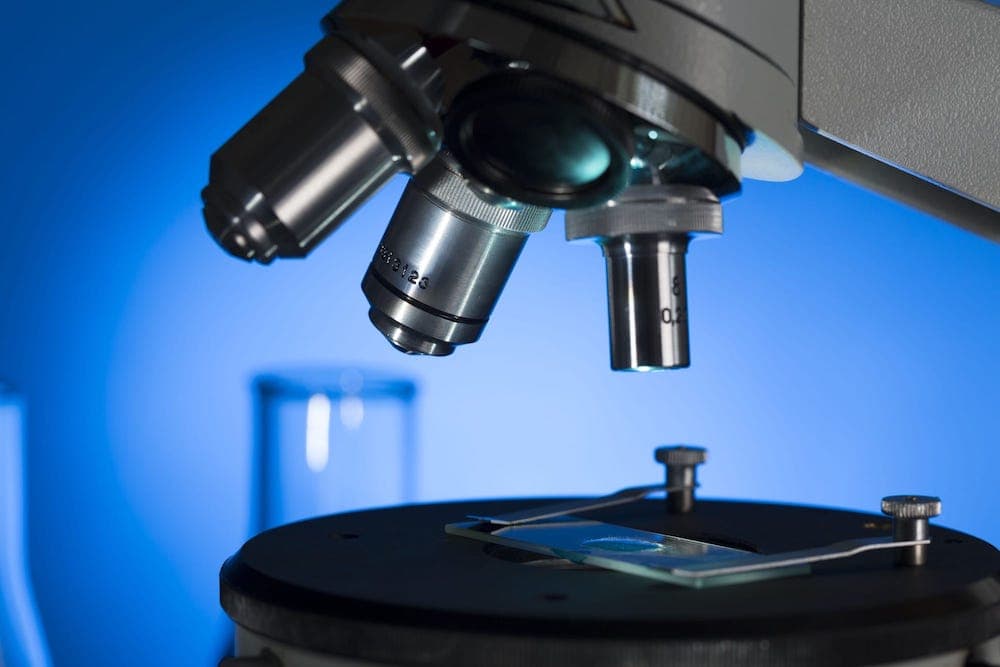Learn : Food & Nutrition
Gastrointestinal Disease & Probiotics
Human and animal intestines are a haven for microorganisms. Here, microbes have a place to grow and they help their host process nutrients, mount effective immune responses, and fight off invading pathogens.
The relationship between animals and their gut microbiome is carefully balanced: overgrowth or absence of specific bacterial strains has been associated with various health problems1. Dysbiosis—an imbalance of the beneficial bacteria found in the gut microbiome—is linked to conditions such as inflammatory bowel disease and diarrhea2,3.
Could ingesting live bacteria, in the form of probiotics for dogs, bring the microbiome back to balance and help relieve intestinal distress?
Most studies have investigated these links in humans, but recent research in pets has surged4. Scientists are building a better picture of our pets’ gut microbiomes so they can improve treatments—which could include probiotics.
GI Disease & the Microbiome
Animal microbiomes naturally oscillate among various states. For example, microbes follow our circadian rhythms5 and pregnancy also shifts the microbiome6.
But sometimes changes are not in favor of health. Pets can suffer from gastrointestinal (GI) distress that is tied to shifts in the types of bacteria that dominate their microbiome. For example, inflammatory bowel disease is linked to microbiomes that look different than healthy individuals7, as is chronic diarrhea3. And dogs with acute diarrhea may have lower diversity in their microbiomes8.
Increases and decreases in specific bacterial groups have been tied to GI disease. abundance of Proteobacteria is seen in dogs with gut inflammation—a signature of chronic intestinal disease9. On the flip side, some dogs with inflammatory bowel disease have decreased amounts in Firmicute groups, such as Turicibacter and Faecalibacterium1.
Researchers don’t yet fully grasp the impact the gut microbiome has on intestinal health—for instance, whether it is a cause of GI disease or merely a symptom. The association between dysbiosis and disease, however, is gaining additional support as research expands to other animals. Some scientists have proposed that research on animal microbiomes can be applied to a wide variety of species—they believe there is a core microbiome that performs similar functions no matter the animal7.
What can we gain from this for our pets? As we understand more about what makes up a healthy microbiome and how it changes when our pets suffer from various diseases, we can narrow down and target the best ways to treat them.
Probiotic Treatment for GI Disease
Probiotics—live microorganisms that are ingested with the goal of nurturing the gut microbiome—are an attractive way to support the body against GI diseases. If symptoms caused by bad bacteria are outcompeting beneficial ones, then the introduction of specific beneficial strains may help keep or restore a healthy, balanced microbiome. Further, the risks associated with probiotic use are extremely low. Probiotic strains of bacteria are typically not dangerous unless your pet has a severely compromised immune system10. Studies show that using probiotics for some diseases, such as ulcerative colitis in humans, helps make symptoms better11.
Most probiotics are composed of lactic acid bacteria, such as Lactobacilli and Bifidobacteria. These strains can survive the acidic environment of the stomach—which would otherwise kill incoming bacteria—and can colonize animal intestines12. Lactobacilli and Bifidobacteria may be important for colonization of animal guts, setting the stage for other strains to take hold13,14. They can help facilitate changes to the gut environment that help beneficial bacteria thrive over detrimental ones. Saccharomyces boulardii, a species of yeast, has also been shown to decrease gastrointestinal symptoms in dogs with gastrointestinal disease, making it a favorable choice for probiotic formulas15-17.
While most studies evaluating the effectiveness of probiotics in GI disease have been done in humans, research in pets has recently expanded. Two studies in dogs and cats found that introducing L. acidophilus as a probiotic led to increases in lactobacilli in the fecal microbiome, showing that the bacteria can indeed colonize and lead to changes in the microbiome18,19. Moreover, in a small study of dogs suffering from acute diarrhea, symptoms were resolved faster in those that were given a probiotic cocktail20. Studies in shelter dogs also suggest that probiotics may have a prophylactic effect, preventing them from developing stress-related diarrhea21-23.
Additional studies will certainly help scientists resolve which diseases are best treated with probiotics and how to make them more effective. Current research suggests that probiotics are a viable option for making our pets feel better when they have microbial imbalances.
But What About Antibiotics?
It makes sense that if overgrowth of bad bacteria responsible for inflammation in the gut, killing them should solve the problem.
Antibiotics—compounds that kill bacteria or slow their growth—are one of the most significant scientific advances in the perpetual fight between humans and infectious diseases. The discovery of penicillin revolutionized treatments for bacterial infections, curing diseases such as pneumonia and diphtheria24. So, if pathogenic bacterial strains are contributing to inflammatory bowel disease, why can’t we just get rid of them with antibiotics?
Part of the problem is antibiotic resistance25. Bacteria share genes like kids share colds, and the widespread use of antibiotics has led to the appearance of strains that current antibiotics cannot touch. Diseases that were once treatable thrive even when antibiotics are prescribed26.
But another issue is that antibiotics have off-target effects. Since the gut microbiome is packed with a broad assortment of bacteria, antibiotics can have unintended consequences on health11. One example is an altered metabolism—antibiotics have long been associated with weight gain and obesity in animals27. Another is infections with pathogens such as Clostridium difficile28. Antibiotic treatment in humans can alter the gut environment to the point where C. difficile takes hold and causes disease.
Studies in humans do show that using a probiotic after antibiotic treatment may help alleviate antibiotic-associated diarrhea29,30. Saccharomyces and Lactobacillus GG were linked to better outcomes, and these strains are commonly used in current probiotic formulations.
If antibiotics are used to treat GI diseases that are caused by an imbalance of bacteria, but also contribute to dysbiosis themselves, it can be counterproductive. It is difficult to restore the microbiome back to its pre-antibiotic state after treatment, and many researchers have turned to fecal transplants31. Concurrent use of antibiotics with probiotics might also have merit, which would seed the microbiome with live beneficial strains during treatment32.
Going forward
GI disease not only affects us but also our most loyal furry companions. Making sure your pet has a healthy diet—and microbiome—can promote their ability to guard against unpleasant GI symptoms.
References
1. Redfern, A., Suchodolski, J. & Jergens, A. Role of the gastrointestinal microbiota in small animal health and disease. Vet. Rec. 181, 370 (2017).
2. Carding, S., Verbeke, K., Vipond, D. T., Corfe, B. M. & Owen, L. J. Dysbiosis of the gut microbiota in disease. Microb. Ecol. Health Dis. 26, 26191 (2015).
3. Volkmann, M. et al. Chronic Diarrhea in Dogs - Retrospective Study in 136 Cases. J. Vet. Intern. Med. 31, 1043–1055 (2017).
4. Schmitz, S. & Suchodolski, J. Understanding the canine intestinal microbiota and its modification by pro-, pre- and synbiotics - what is the evidence? Vet Med Sci 2, 71–94 (2016).
5. Rosselot, A. E., Hong, C. I. & Moore, S. R. Rhythm and bugs: circadian clocks, gut microbiota, and enteric infections. Curr. Opin. Gastroenterol. 32, 7–11 (2016).
6. Edwards, S. M., Cunningham, S. A., Dunlop, A. L. & Corwin, E. J. The Maternal Gut Microbiome During Pregnancy. MCN Am. J. Matern. Child Nurs. 42, 310–317 (2017).
7. Blake, A. B. & Suchodolski, J. S. of gut microbiota for the health and disease of dogs and cats. Anim Fron 6, 37–42 (2016).
8. Guard, B. C. et al. Characterization of microbial dysbiosis and metabolomic changes in dogs with acute diarrhea. PLoS One 10, e0127259 (2015).
9. Moon, C. D., Young, W., Maclean, P. H., Cookson, A. L. & Bermingham, E. N. Metagenomic insights into the roles of Proteobacteria in the gastrointestinal microbiomes of healthy dogs and cats. Microbiologyopen e00677 (2018). :10.1002/mbo3.677
10. Probiotics for Dogs: What You Need to Know | petMD. Available at: https://www.petmd.com/dog/general-health/probiotics-dogs-what-you-need-know. (Accessed: 30th December 2018)
11. Sokol, H. Probiotics and antibiotics in IBD. Dig. Dis. 32 Suppl 1, 10–17 (2014).
12. Grześkowiak, Ł., Endo, A., Beasley, S. & Salminen, S. Microbiota and probiotics in canine and feline welfare. Anaerobe 34, 14–23 (2015).
13. O’Callaghan, A. & van Sinderen, D. Bifidobacteria and Their Role as Members of the Human Gut Microbiota. Front. Microbiol. 7, 925 (2016).
14. Moles, L. et al. Bacterial diversity in meconium of preterm neonates and of their fecal microbiota during the first month of life. PLoS One 8, e66986 (2013).
15. Aktas, M. S., Borku, M. K. & Ozkanlar, Y. AS A PROBIOTIC IN DOGS WITH LINCOMYCIN INDUCED DIARRHOEA. Bull. Vet. Inst. Pulawy 51, 365–369 (2007).
16. D’Angelo, S. et al. Effect of Saccharomyces in with chronic enteropathies: , placebo-controlled study. Vet. Rec. 182, 258 (2018).
17. Barko, P. C., McMichael, M. A. & Swanson, K. S. The gastrointestinal microbiome: a review. Journal of veterinary (2018).
18. Baillon, M.-L. A., Marshall-Jones, Z. V. & Butterwick, R. F. Effects of probiotic Lactobacillus acidophilus strain DSM13241 in healthy adult dogs. Am. J. Vet. Res. 65, 338–343 (2004).
19. Marshall-Jones, Z. V., Baillon, M.-L. A., Croft, J. M. & Butterwick, R. F. Effects of Lactobacillus acidophilus DSM13241 as a probiotic in healthy adult cats. Am. J. Vet. Res. 67, 1005–1012 (2006).
20. Herstad, H. K., Nesheim, B. B., L’Abée-Lund, T., Larsen, S. & Skancke, E. Effects of a probiotic intervention in acute canine gastroenteritis--a controlled clinical trial. J. Small Anim. Pract. 51, 34–38 (2010).
21. Bybee, S. N., Scorza, A. V. & Lappin, M. R. Effect of the probiotic Enterococcus SF68 on of diarrhea in cats and dogs housed in an animal shelter. J. Vet. Intern. Med. 25, 856–860 (2011).
22. Ms, R. K., Levy, K., Mundell, P. & Hayek, M. G. Effects of Varying Doses of a Probiotic Supplement Fed to Healthy Dogs Undergoing Kenneling Stress.
23. Rose, L., Rose, J., Gosling, S. & Holmes, M. Efficacy of a Probiotic-Prebiotic Supplement on Incidence of Diarrhea in a Dog Shelter: A Randomized, Double-Blind, Placebo-Controlled Trial. J. Vet. Intern. Med. 31, 377–382 (2017).
24. Alexander Fleming Discovery and Development of Penicillin - Landmark - American Chemical Society. American Chemical Society Available https://www.acs.org/content/acs/en/education/whatischemistry/landmarks/flemingpenicillin.html. (Accessed: 30th December 2018)
25. Blair, J. M. A., Webber, M. A., Baylay, A. J., Ogbolu, D. O. & Piddock, L. J. V. Molecular mechanisms of antibiotic resistance. Nat. Rev. Microbiol. 13, 42–51 (2015).
26. Chambers, H. F. & DeLeo, F. R. Waves of resistance: Staphylococcus aureus in the antibiotic era. Nat. Rev. Microbiol. 7, 629 (2009).
27. Francino, M. P. Antibiotics the Human Gut Microbiome: Dysbioses and Accumulation of Resistances. Front. Microbiol. 6, 1543 (2015).
28. Theriot, C. M. et al. Antibiotic-induced shifts in the mouse gut microbiome and metabolome increase susceptibility to Clostridium infection. Nat. Commun. 5, 3114 (2014).
29. McFarland, L. V. Meta-analysis of probiotics for the prevention of diarrhea and the treatment of Clostridium disease. Am. J. Gastroenterol. 101, 812–822 (2006).
30. Hempel, S. et al. Probiotics for the prevention and treatment of antibiotic-associated diarrhea: a systematic review and meta-analysis. JAMA 307, 1959–1969 (2012).
31. Suez, J. et al. Post-Antibiotic Gut Mucosal Microbiome Reconstitution Impaired by Probiotics and Improved by Autologous FMT. Cell 174, 1406–1423.e16 (2018).
32. Hickson, M. Probiotics in the prevention of antibiotic-associated and Clostridium infection. . Adv. Gastroenterol. 4, 185–197 (2011).



 Microbes in the Gut
Microbes in the Gut
 Microbiome in Nutrition
Microbiome in Nutrition
 Probiotics and Pet Health
Probiotics and Pet Health
 Dog's Upset Stomach
Dog's Upset Stomach
 Evolution of Microbiome Research
Evolution of Microbiome Research
 Giardia & Its Link to the Microbiome
Giardia & Its Link to the Microbiome